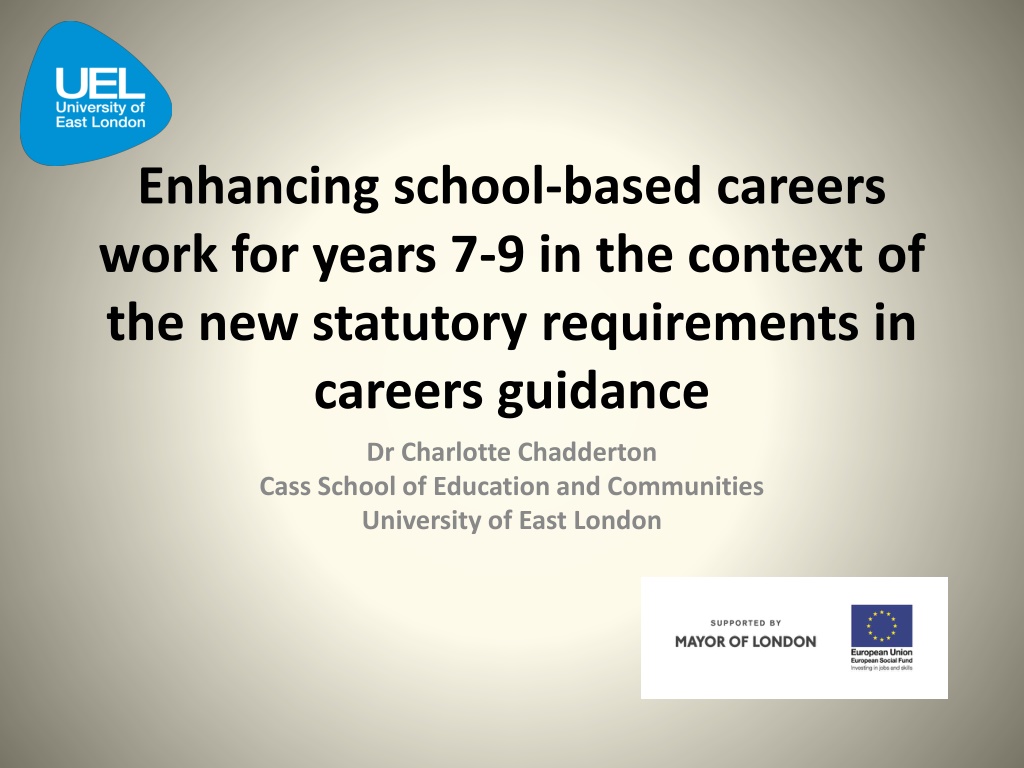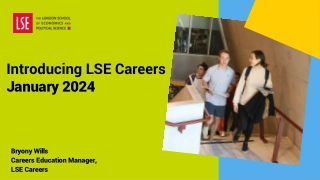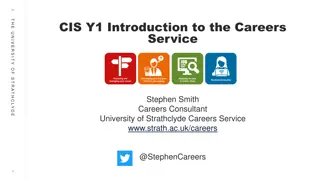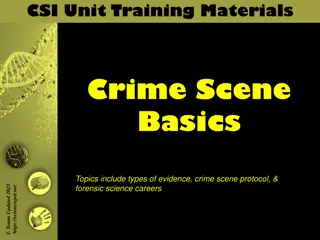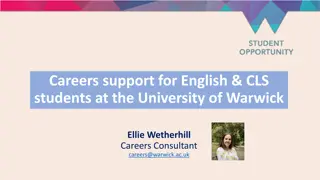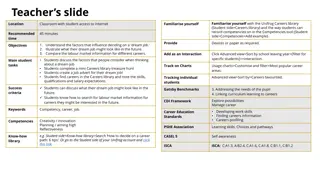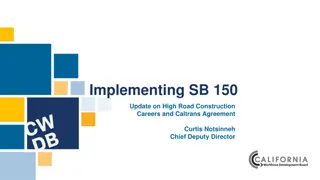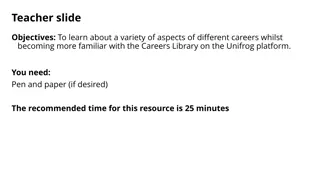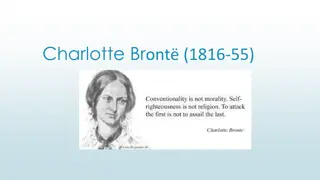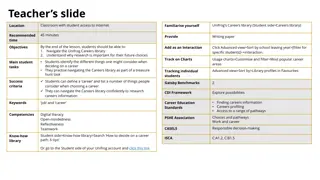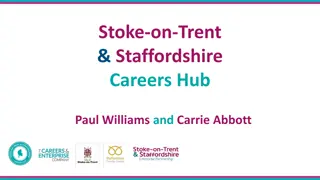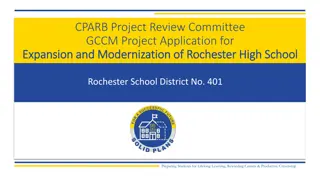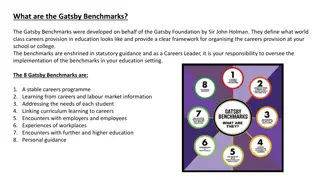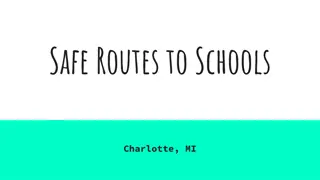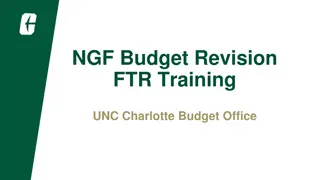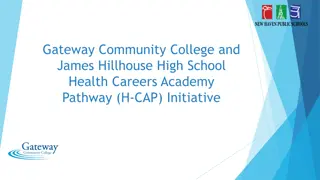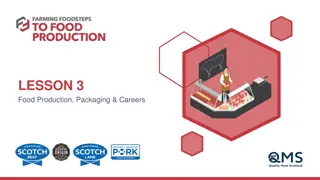Enhancing School-Based Careers Work for Years 7-9: A Research Project by Dr. Charlotte Chadderton
This action research project, conducted in two schools in East London, aimed to improve careers work for students in years 7-9 in light of new statutory requirements. The study highlighted the challenges schools face in meeting these obligations and provided recommendations for enhancing school-based careers programs. Key areas discussed include definitions of careers guidance, benefits of career work for students and the labor market, the current political situation affecting careers work in schools, and implications for education and guidance practices.
Download Presentation

Please find below an Image/Link to download the presentation.
The content on the website is provided AS IS for your information and personal use only. It may not be sold, licensed, or shared on other websites without obtaining consent from the author. Download presentation by click this link. If you encounter any issues during the download, it is possible that the publisher has removed the file from their server.
E N D
Presentation Transcript
Enhancing school-based careers work for years 7-9 in the context of the new statutory requirements in careers guidance Dr Charlotte Chadderton Cass School of Education and Communities University of East London
This presentation Action research project conducted in two schools in East London 2013-14 Funded by Greater London Authority Aim: to enhance careers work for years 7-9. Arguments: There is much that schools can do, through internal change, to enhance their school-based careers programme. The new arrangements have left schools with requirements they have neither the funding, experience, expertise nor networks to fulfil. Recommendations.
Definitions Careers Guidance often used as a catch-all term Guidance is understood as support provided normally on a one-to-one basis to support individual transitions and decision-making. Careers education provides the wider context for this guidance, and can include Labour Market Information, a wider understanding of training and study routes and job families (related roles in a given field), decision-making processes, career management skills
Benefits of Careers work Benefits to young people Benefits to the labour market Social equality benefits Where there skills shortages Countering aspirations mismatch Building career management skills Education and vocational decisions remain highly gendered, classed and raced Potentially including employers Help students navigate complex array of education options Raises motivation and achievement Raising participation age
Current political situation The Education Act 2011 handed over responsibility for careers work to schools Funding mostly withdrawn from local authorities and Connexions Schools not provided with any extra funds to fulfil this statutory requirement Schools can choose whether to commission from the Local Authority, from private providers, take CEIAG provision in-house, or a combination of these Market in CEIAG
Implications Education versus guidance independent impartial Employer engagement Qualified staff
This project funded by the Greater London Authority 10-month study in two schools in East London developed and tested ways of enhancing school-based careers work for pre-GCSE pupils and worked towards a whole-school CEIAG strategy Careers Education a more integrated approach to careers work in the school and curriculum, which provides the wider context for individual advice and guidance. Years 7-9 careers work is more beneficial the earlier it begins, and provides context for GCSE choices made in Y9. But most secondary schools only engage with CEIAG in years 10 and 11 Middle-attainers one of the groups most in need of CEIAG because of the potentially wide range of academic and vocational options open to them, but least likely to receive adequate support
School 1 a mixed, 11-16 school in a deprived area with a large number of pupils eligible for free school meals. School 2 a single-sex girls school with a sixth form in an area of high deprivation with a high proportion of pupils eligible for free school meals.
Findings. Stage 1: mapping provision Focus on year 11 (occasionally 10) Local authority support Careers coordination Little Pupils unaware and unsupported Guidance integration in lessons Connections with careers not explicit
Findings: stage 1 contd. Data not used to inform careers programme Low awareness among teachers Lack of impartiality Lack of employer contacts Lack of vocational options and info
Enhancing provision Education focus Working groups Leadership CPD for teaching staff Employer contacts
Impact: staff Teachers are getting more involved in CEIAG than they would otherwise . (Careers Coordinator School 1) After the CPD session I ve seen some change in some staff. (Careers Coordinator, School 2).
Impact: students It was really useful because people from different jobs came and from that we could decide our options and it could help us in our life (Pathways event , year 9 pupil, School 1) I liked it cos we learned different things, I d never done engineering before at all so I learnt that you can do engineering with anything even scrap stuff, you can make it and plan design . (STEM day, year 7 pupil, School 2)
Impact: students ...he said that if somebody asks you what you want to do if you don t tell them with confidence that means you don t really want to do it, so that made me think as well as I need to make sure that I m 100% sure that I do want to do what I want to do and if anyone asks me I need to hold my hand up straight and say yeah this is what I wanna do even if anyone laughs at me . (Pathways event, year 9 pupil, School 1) I wasn t too confident if I wanted to be a solicitor before this but after the event and the assemblies we had I m confident . (Careers assemblies and pathways event, year 9 pupil, School 1)
Conclusions Schools unprepared for shift There s a great deal schools can do via internal changes Year 7-9 not too young to engage: evidence of widening horizons and increasing confidence Most important factor is leadership However, schools lack careers expertise, networks, experience which suggests shift of responsibility to schools possibly na ve
Policy recommendations Short of recommending the re-introduction of a discrete and targeted careers service More specific guidelines based on work of e.g. Association for Careers Education and Guidance; Careers as strategic priority; Focus on general careers education rather than just guidance; Less focus on business and more focus on internal changes; Bridging services to be set up to intermediate between employers, educational institutions and organisations offering careers activities; Qualified careers coordinator (or even a careers coordination team/ staff advisory group) with high status in school; CPD for teachers, including Labour Market Information; Extra funding to be made available for these changes.
